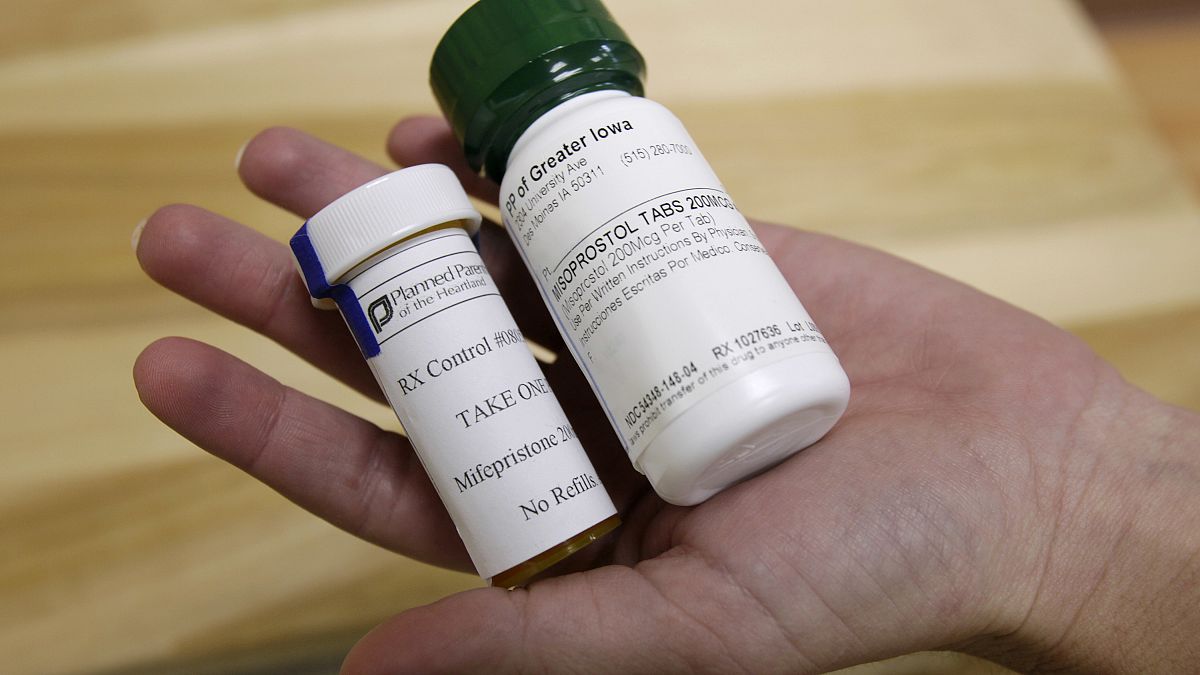In several European countries, a US-based anti-abortion organisation connected undercover reporters to local doctors for a dangerous abortion reversal treatment.
Several doctors in Europe prescribed a controversial and unproven treatment which is claimed can reverse a medical abortion, according to an investigation.
Investigators from the UK-based openDemocracy contacted doctors in Italy, Lithuania, Portugal, Romania, Spain, and the UK who were willing to provide an “abortion pill reversal” treatment.
The undercover workers were put in touch with the doctors via a right-wing Christian organisation in the United States.
Posing as pregnant women who had taken the first of two pills for a medical abortion, they contacted the US group, Heartbeat International, through a hotline to inquire about reversing their decisions.
The right-wing group had US-based nurses give the investigators instructions on what to ask for to get a prescription for the treatment in Belgium, Germany, Croatia and Russia. In other European countries, the investigators were put in touch with doctors who would prescribe the medicine.
The anti-abortion group claims that by taking progesterone after the first pill in a medical abortion, they could stop the abortion. Though women who call the hotline have to say they wanted to reverse their abortion, the group assured them that the treatment was safe.
It's a treatment that was trialled in a 2019 US study, which was later halted due to a quarter of participants having severe bleeding.
What is a medical abortion?
Women who are seeking to terminate a pregnancy have the choice between a medical abortion -- the abortion pill -- and a surgical abortion. Both are a safe and effective way of getting an abortion.
A medical abortion, possible for women who are less than 10 weeks pregnant, involves taking two pills that are up to 48 hours apart.
The first pill, mifepristone, blocks the hormone progesterone which plays a large role in pregnancy. The second pill, taken later, causes cramping and bleeding to empty the uterus. It’s a method that has been proved to be about 94 to 98% effective.
What is the unproven abortion pill 'reversal'?
Anti-abortion activists who support abortion "reversal" claim that after taking the first pill, mifepristone, a woman can reverse the abortion before taking the second pill.
But this reversal is based on unproven treatment that involves taking high doses of the hormone progesterone.
It was first used by Dr George Delgado in a case study of just six women of which four carried their pregnancies to term.
What are the issues with the treatment?
The American College of Obstetricians and Gynaecologists said the claims regarding this reversal treatment are "not based on science and do not meet clinical standards."
The college "does not support prescribing progesterone to stop a medical abortion". The statement was issued as some US states required that women be offered information about an abortion reversal.
A study of this “reversal” treatment in 2019 was eventually halted in the United States after a quarter of patients experienced severe bleeding.
Speaking to Euronews, Elsa Viora, president of the Italian Association of Hospital Obstetricians and Gynecologists, said the claim that progesterone could reverse abortion was not grounded in scientific evidence.
"If we stick to scientific evidence, there is no data to support the claim that progesterone therapy can change the clinical course after taking RU-486 (an abortive pill)," Viora said.
"The most recent study, a randomised trial carried out according to strict technical criteria, concludes that progesterone is not effective as an antagonist of mifepristone," the expert said.
Professor Lesley Regan, Head of the Department of Obstetrics and Gynaecology at Imperial College in the UK, summarised it this way:
“So number one, it doesn't work. And then second, not only is it not effective, but it also has a high risk of giving women abnormal bleeding patterns, which obviously comes with its own dangers and concerns.”
"Terminating a pregnancy is always a painful choice for women. It is a choice that must be discussed beforehand," Viora said.
"But once it has been made, it becomes difficult to think of suddenly changing the decision."
What do abortion 'reversal' advocates say?
Anti-abortion activists claim that scientific studies on the effectiveness and safety of the procedure are biased.
"When you talk about abortion, science is very ideological and biased. Science is blinded by bias. You’d have to look at other studies run by anti-abortionists, too," Francesca Romana Poleggi, editorial director of Pro Vita & Famiglia told Euronews.
Heartbeat International says progesterone has been used for decades to prevent miscarriage and preterm birth.
It also claims that more than 2,000 women have successfully stopped an abortion through the method.
How do abortion 'reversal' promoters engage with women?
openDemocracy told Euronews that in a number of countries, including the UK, the ‘abortion pill reversal’ hotline was promoted by local anti-abortion groups on social media.
In countries such as Canada, the hotline was advertised at bus stops, openDemocracy said.
Heartbeat International also relies on a global network of so-called "crisis pregnancy centres" which may refer women to this treatment.
Women calling the hotline are attended by a nurse. They are asked to sign a consent form while the nurse searches for a local doctor to connect the woman to.
Euronews has seen the consent form, whereby the patient formally agrees to receive the treatment and not to hold Heartbeat International liable for its outcome.
The form also urges the patient to seek "emergency medical attention immediately" in case of "heavy bleeding, faintness, severe abdominal pain."
What did openDemocracy find in European countries?
Undercover openDemocracy workers say that the abortion rescue hotline put them in touch with local doctors in some European countries that were willing to prescribe this unproven medication.
A US-based nurse initially struggled to put an undercover openDemocracy reporter in touch with a doctor but eventually put them in contact with a local doctor who emailed information about the treatment and said it could be prescribed by a family doctor.
In Spain, an investigator was emailed a prescription from a local doctor who said it didn’t have risks and would do her "a lot of good."
The US-based organisation has a connection with anti-abortion activists in both countries, according to their website.
Reporters from openDemocracy were also put in contact with local doctors in Romania and Portugal who would prescribe the treatment, the organisation said.
Meanwhile in Croatia, Belgium and Germany, US-based nurses emailed OpenDemocracy investigators instructions to take to a hospital to get a prescription.
In the UK, the doctor contacted by openDemocracy said that at least 100 women had tried the treatment.
Abortion is available to women in most EU countries. Malta is the only EU country where it is illegal.
In Poland, abortion has been severely limited, particularly after a recent court decision ruling that it is no longer legal in the case of severe impairment of the foetus. The decision amounts to a near-total ban on the practice in the country.
What can be done?
Women rights advocates have called on governments to do more to investigate and regulate the unproven practice.
“It’s critical that governments do more to regulate and restrict the dissemination of such initiatives,” said Mina Barling, director of external affairs at the International Planned Parenthood Federation (IPPF).
A US expert pointed out that the practice was still new in many European countries, meaning that governments and medical societies hadn't put in place appropriate safeguards yet.
British MP Munira Wilson and Liberal Democrat spokesperson for health told openDemocracy that the practice was "completely unacceptable". "Regulators must investigate this as a matter of urgency and put a stop to this harmful practice," she said.
In practice, however, legal regulation may prove tricky.
"The drug progesterone is available on prescription. If you get a clinician to give it to you, you can't stop that because it's not in itself inherently a dangerous drug," Regan told Euronews.
"But used in this context, it's not effective and therefore we should be discouraging it," the medical expert said.

